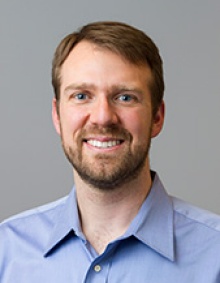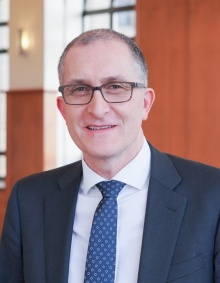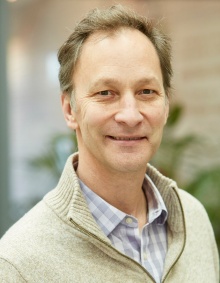Richard V. Lee, MD Lectureship
The School of Public Health and Health Professions has established an annual lectureship, focused on aspects of global health, to honor Richard V. Lee, MD.
Previous Richard V. Lee, MD Lectureships
Jonathan Hofmann, PhD, MPH, presented "Investigating the carcinogenic potential of PFAS and pesticides using molecular epidemiologic approaches," Nov. 14, 2025, via Zoom

Jonathan Hofmann is a senior investigator in the Occupational and Environmental Epidemiology Branch (OEEB) of the Division of Cancer Epidemiology and Genetics (DCEG) at the National Cancer Institute (NCI). He received a PhD in epidemiology and MPH in environmental and occupational health from the University of Washington. Hofmann serves as the chair of the NCI PFAS Working Group and is the principal investigator (PI) of the Biomarkers of Exposure and Effect in Agriculture (BEEA) study and the NCI co-PI of the Agricultural Health Study. His research focuses on understanding the carcinogenic potential of pesticides and other agricultural exposures and PFAS, and he also uses molecular epidemiologic approaches to investigate the etiology and natural history of multiple myeloma and its precursor.

Susan M. Gapstur, PhD, MPH, is an epidemiology consultant with over 30 years of scientific experience researching medical, biological and lifestyle determinants of cancer risk including alcoholic beverage consumption. She was senior vice president of the Behavioral and Epidemiology Research Group at the American Cancer Society before embarking on her current work producing a comprehensive review and evaluation of the scientific evidence on the potential reduction in alcohol-related cancer risk due to reduction or cessation of alcoholic beverage consumption. Dr. Gapstur was previously a professor in the Department of Preventive Medicine at Northwestern University and the associate director of Cancer Prevention and Control in the Robert H. Lurie Comprehensive Cancer Center of Northwestern University in Chicago.

Andrea Baccarelli, MD, PhD is the Leon Hess Professor and chair of the Department of Environmental Health Sciences and serves as director of the NIH/NIEHS P30 Center for Environmental Health in Northern Manhattan. Baccarelli's work has supported international best practices for air pollution control developed by multiple agencies worldwide, and his findings have served as the basis for the Environmental Protection Agency's decision to enforce stricter guidelines for human exposure. Baccarelli's research investigates molecular mechanisms as pathways linking environmental exposures to human disease. Current projects investigate a range of mechanisms, including epigenomics, epitranscriptomics, extracellular vesicles and small non-coding RNAs, mitochondrial DNA, and the microbiome. Baccarelli was elected to the National Academy of Medicine for his pioneering work showing that environmental exposures adversely affect the human epigenome and has been included in the Web of Science list of highly cited, world's most influential scientists of the past decade.

Lecturer Biography
Sixth Annual Lecture
Climate-Disease Connections: Associations, Processes and Incorporation in Infectious Disease Forecast
Jeffrey Shaman is a professor in the Department of Environmental Health Sciences and director of the Climate and Health Program at the Columbia University Mailman School of Public Health, and faculty chair of the Earth Institute at Columbia University. He studies the survival, transmission and ecology of infectious agents, including the effects of meteorological and hydrological conditions on these processes. Dr. Shaman's work-to-date has primarily focused on mosquito-borne and respiratory pathogens. He uses mathematical and statistical models to describe, understand and forecast the transmission dynamics of these disease systems, and to investigate the broader effects of climate and weather on human health. Dr. Shaman holds a BA in biology from the University of Pennsylvania and an MA, MPhil and PhD in climate and geophysics from Columbia.

Lecturer Biography
Dr. Ashish K. Jha, MD, MPH, dean of the Brown University School of Public Health, and a professor of health services, policy and practice is a leading national figure addressing the COVID-19 pandemic and is interviewed frequently by national news organizations such as CNN.
Dr. Jha is the former K.T. Li Professor of Global Health at the Harvard T.H. Chan School of Public Health and director of the Harvard Global Health Institute (HGHI). He is a practicing general internist and also a professor of medicine at Harvard Medical School. Dr. Jha received his MD from Harvard Medical School and trained in internal medicine at the University of California in San Francisco. He completed his general medicine fellowship at Brigham & Women’s Hospital and received his MPH from the Harvard T.H. Chan School of Public Health. Dr. Jha is a member of the Institute of Medicine at the National Academies of Sciences, Engineering, and Medicine. In September 2020, Dr. Jha began his position as dean of the Brown University School of Public Health.
Dr. Jha’s research focuses on improving the quality and costs of healthcare systems with a specialized focus on the impact of policies. He has published over 200 papers in prestigious journals such as the New England Journal of Medicine and the BMJ, and heads a personal blog on using statistical data research to improve health quality. He has led groundbreaking research around Ebola and is now on the frontlines of the COVID-19 response.
Dr. Jha leads national analysis of key issues around the COVID-19 pandemic, advising policy makers and elected officials at the state and federal level and appearing frequently on national television news outlets such as CNN, MSNBC and Fox, and in written coverage from national newspapers including the New York Times and the Washington Post. His team is providing critical analysis and data on national and state-by-state testing with Dr. Jha, who is also a vocal advocate for increased testing and contact tracing who has written extensively on the subject. His work has appeared in the New England Journal of Medicine, Health Affairs, the Atlantic, the Wall Street Journal and Stat News among others.

Dr. Marc Weisskopf
In 2019, SPHHP was pleased to welcome Dr. Marc Weisskopf, PhD, ScD, a Cecil K. and Philip Drinker Professor of Environmental Epidemiology and Physiology, at the Harvard T.H. Chan School of Public Health, as the 4th annual Lee lecturer for this event.
On Oct. 4-5, 2018, the SPHHP's Office of Global Health Initiatives welcomed Dr. Na He to UB, to provide the 3rd Annual Richard V. Lee Lecture in Global Health. Dr. He is a Professor of Epidemiology, Dean, School of Public Health, Fudan University, Shanghai, China, and spoke on “HIV/AIDS Epidemic and Control: China CARES,” imparted his expertise in health systems management and infectious disease.
The visit also included Topic-based Group Meetings Dr. Na He was joined by Dr. Zhuohui Zhao, PhD, Associate Professor and Assistant Dean, School of Public Health at Fudan University and Dr. Yan Zheng, Professor, School of Life Sciences at Fudan University.
On Sept. 28-29, 2017, the SPHHP's Office of Global Health Initiatives welcomed Dr. Claudio Lanata to UB. Lanata is a leading global health scholar and Senior Researcher at the Nutritional Research Institute in Lima, Peru. Dr. Lanata provided the 2nd Annual Richard V. Lee Lecture in Global Health, titled “What is a pathogen? Lessons from decades of study of enteric pathogens,” and imparted his expertise in health systems management and infectious disease.
The visit also provided opportunities for Discussions & Talks: Dr. Lanata was very interested in developing new collaborative relationships with colleagues at UB. Two talks were offered:
- Waiting for the next cholera epidemic in Latin America.
- Improving health care quality: The challenge of motivating change in health systems.
Faculty Sessions: Dr. Lanata hosted a number of faculty discussions. Topics included: Antimicrobial resistance, Child survival, Improving hygiene, the Enteric microbiome, and more.
